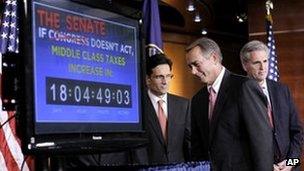Is Keystone a Touchstone?
- Published
- comments

A quick decision on the pipeline was mandated in a deal over federal spending
On the face of things, Barack Obama's decision to reject the planned Keystone XL oil pipeline is quite a significant shift for a president who for the last year at least has seemed reluctant to endorse any policy with a green tinge.
The pipeline would have brought oil from the Canadian tar sands through a number of US states to the Texas shoreline, external, adding to the capacity of existing lines.
The project was bitterly opposed by US environmental groups, external - in fact it has put more people on the streets and garnered more column inches than any other environmental topic in recent months.
Their concerns were partly local, in that the route could have disturbed important ecological sites.
It was also global, in that extracting oil from tar sands is very energy intensive - and they're so plentiful that full-scale development would seriously delay the transition to low-carbon alternative fuels that will be necessary if transport emissions in particular are to be curbed.
So for groups that led the opposition, this might be an apt moment to open the champagne - or at least, the Californian sparkling wine.
But there are also reasons for caution.
To a large extent, the rejection was a case of the pipeline's largely Republican backers in Congress shooting themselves in the foot.
Late last year, as a sop for approving national budgetary measures, they pushed through a requirement for the administration to make up its mind within 60 days - which did not allow enough time for a proper evaluation, virtually ensuring a defeat.
Further applications will come. And there's no guarantee that the administration will want to, or be able to, respond with further rejections.

What Keystone XL has done is to keep climate change on the agenda in the US at a time when, in the febrile conditions of the race for the Republican presidential nomination, it's been in danger of becoming a non-issue.
In Canada itself, which announced its withdrawal from the Kyoto Protocol a few weeks back amid a gradual alignment with the US position on climate and energy policy, the issue is being kept alive by a similar ruckus over another tar sands pipeline, the Northern Gateway.
This would take oil to the coast of British Columbia for export to Asia. It's being opposed by, external a coalition of First Nations and environmental groups.
Backers of both projects are arguing for them partly on the basis that they will create employment.
Oil industry sources said Keystone XL would create 20,000 jobs, though other studies suggested the real figure was about a third of that.
What's a bit odd is that the opposite argument is hardly being heard.

Iranian intentions around the Straits of Hormuz are the latest factor pushing up oil prices
There are studies around, external showing that renewables generate more employment per unit of energy than fossil fuels.
The equations are not completely straightforward.
For example, if Canadian jobs are being created to export oil, external to China while Canadians themselves consume some other form of energy, that's still a net increase in employment from tar sands.
Then there are indirect effects, which are even more difficult to quantify. Pro-fossil-fuel groups argue, external that if using renewables is more expensive, that has an overall negative impact on growth which should, in principle, curb employment.
On the other hand, an oil spill at a terminal along the pristine British Columbian coast - a scenario cited by opponents of the Northern Gateway project - would damage the employment prospects of local people in fishing and tourism.
Whatever the precise numbers, they're clearly more complex than the simple figures being bandied around by the pipeline's corporate and political backers might imply.
Meanwhile, the US has re-gained the lead on global investment in renewables, external that China had taken from it in 2008.
One of the incentives has been the high and unstable price of fossil fuels in recent years.
However, on the most obvious indicator of all - the oil price - it's very much a double-edged sword.
Last year saw the highest annual average price in history, around $111 per barrel, external of Brent crude, despite the world's economic woes.
That's an incentive to curb consumption; but it's also an incentive to accelerate development of tar sands.
The companies behind the project argue that they will be developed at some point, external, regardless of whether the products flow out South, North, West or East.
If the economics favour it, the companies are probably correct, unless opponents can come up with something much more potent than the coalition that led to Keystone XL's rejection.
In the old cliche, they won the battle; but the war is another matter.